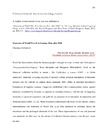Memories of World War II in German Film after 1945
Citation
“Memories of World War II in German Film after 1945”, in: The Long Aftermath: Cultural Legacies of Europe at War, 1936-2016, eds. Manuel Braganca and Peter Tame. Oxford: Berghahn Books, 2015, pp. 200-218.
“Memories of World War II in German Film after 1945”, in: The Long Aftermath: Cultural Legacies of Europe at War, 1936-2016, eds. Manuel Braganca and Peter Tame. Oxford: Berghahn Books, 2015, pp. 200-218.
Abstract
Much has been written about the German people’s struggle to come to terms with their past or ‘Vergangenheitsbewältigung’, from Alexander and Margarete Mitscherlich’s book on the Germans’ collective inability to mourn – Die Unfähigkeit zu trauern (1967) – to Aleida Assmann’s numerous intriguing analyses of memory culture, physical inscriptions of traumatic memory and the inability to express them (Assmann 1999, 2006), to Reinhard Koselleck’s formulation of negative memory (‘negatives Gedächtnis’) that commemorates crimes against humanity committed by Germans as separate or secondary memory, with the aim of triggering memories of personal experience and guilt for the purposes of re-education, humanisation and democratisation (2002: 21–32). These discourses contextualise the focus of this chapter, namely representations and memories of World War II in films produced in Germany during the immediate and the prolonged aftermath of the war. These representations of war and personal war memories on film draw on the culture of collective German memory over the past seven decades.


